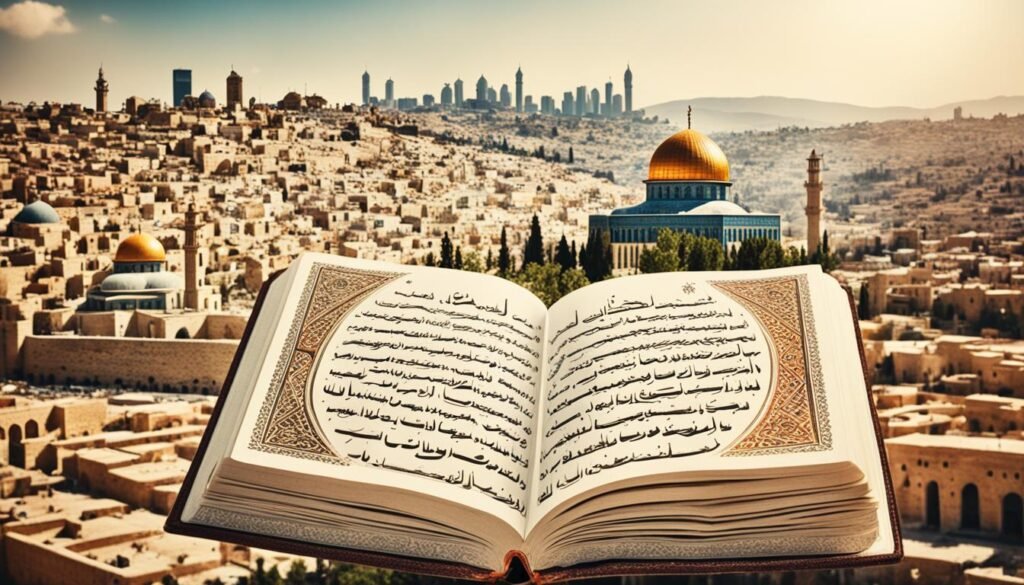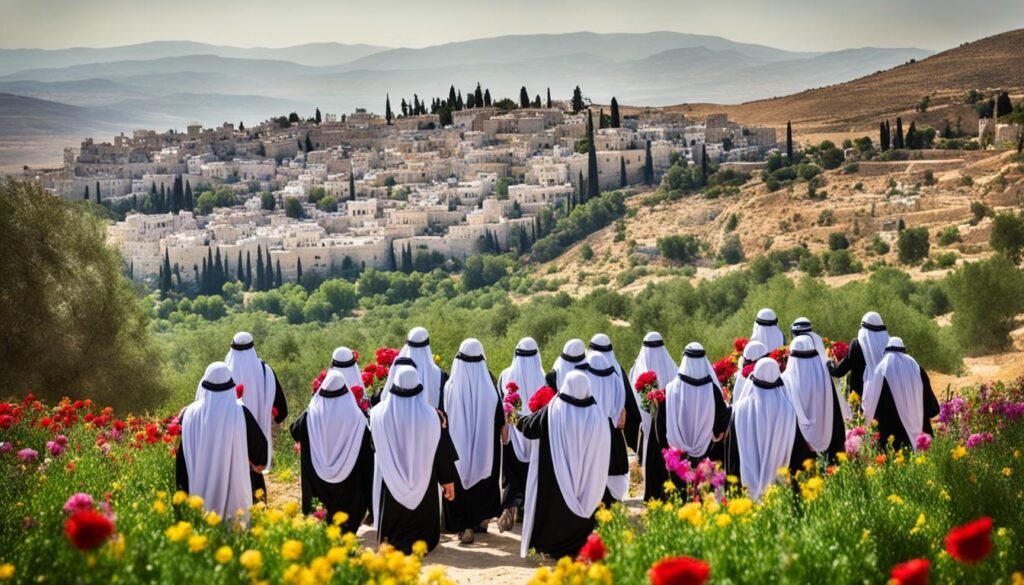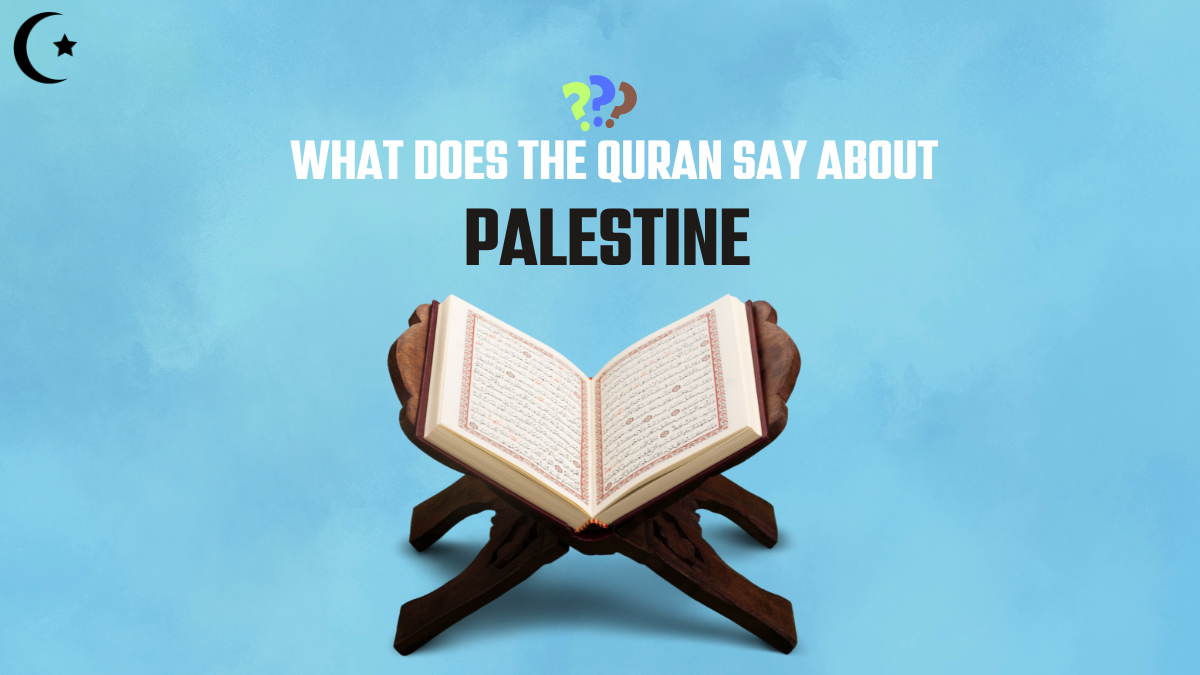The ongoing conflict in Palestine grabs headlines worldwide. It makes us ask: What Does The Quran Say About Palestine? The Quran is more than a spiritual guide for many. It also talks about Palestine, showing its importance in Islamic texts. This piece will look into the Quran’s views on Palestine’s history, its divine prophecies, and what they mean for Muslims now.

The Historical Context of Palestine in Islamic Texts
Palestine is very important in Islamic teachings. It is known as the “Holy Land.” This name shows how deeply it matters to Muslims, starting with Prophet Muhammad’s time. The area has been a meeting point for many cultures, filled with spiritual and historical stories.
Many Islamic texts, like the Quran and Hadith, talk about Palestine. They mention prophets like Jesus and Moses, showing its key role in Islam. The Quran tells stories of the Israelites and Muslims ruling this land. This shows the changing power and beliefs in its history.
The Quran doesn’t just talk about the place. It shares moral and spiritual lessons from its people’s stories. Different interpretations of these texts often focus on the land’s deep connection to faith. This makes Palestine a symbol of strength and spiritual heritage in Islam.
Divine Prophecies and Their Significance
Divine prophecies in the Quran give us deep insights into Palestine’s story. They show that dominance and being ruled are part of history’s cycle. Righteousness will always win, making these prophecies very important.
They tell us that true followers of God will get the land as their inheritance. This is a big deal for believers today. It tells them what they must do and why they need to fight for justice.
The Quran talks about the return of the children of Israel to Palestine in verses like 17:1-8. This is not just history; it’s a message for today’s believers. It reminds them of their duties and the importance of living justly.
It also warns about the dangers of forgetting God’s teachings. This is shown in verses like 17:4. The story of the destroyed temples and the land’s history is a lesson for us all.
These prophecies make us think about what our faith really means. The Quran changes our view of Al Masjid Al Aqsâ. It moves our focus from the past to the present and future.
The Quran’s View on Inheritance of the Land
The Quran talks about inheritance in a big way, especially about who owns the land. In Surah Al-Anbiya (21:106-108), God promises that the good people will get the land. This promise has lasted for centuries, linking with messages from other sacred texts.
The Psalms also talk about this, saying the righteous will get their inheritance. This shows God’s justice and mercy.
Understanding Surah Al-Anbiya’ 21:106-108
Surah Al-Anbiya explains the Quran’s view on inheritance, focusing on lands like Palestine. It says God promises the land to the righteous, no matter what happens. Those who follow God’s teachings are seen as the true owners of the land.
This idea is very important in Islam, showing the deep connection between believers and their homeland.
The Connection with Psalms and Prophetic Messages
The Quran and the Psalms both talk about inheritance and hope. They say that even when things are tough, being righteous will lead to success. Scholars believe that following God’s teachings is key to getting this inheritance.
They say that even if power changes, God’s plan always leads the right people back to their heritage.
Prophecies Concerning the Israelites
The Islamic texts tell the story of the Israelites’ rise and fall. They show how their time in power in Palestine was tied to their faithfulness. The stories warn of what happens when they disobey, showing a cycle of divine justice.
Temporary Dominance of the Israelites
The Israelites once had a lot of power in Palestine, as many religious texts say. Their right to the land comes from early stories, but these stories also warn that their glory was short-lived. The Quran says their fortunes fell because they lost faith, showing their power was never meant to last.
The Role of Divine Justice in History
Stories about the Israelites often talk about divine justice. The Quran tells of times when the Israelites faced God’s wrath for not keeping their promises. These stories show that not following spiritual rules led to big problems. This idea of divine justice is key to understanding the Israelites’ story and their impact on the region.
The Role of Muslims in the Holy Land
Muslims have been key in Palestine’s history. Under Caliph Umar, the region became a key part of the Islamic Caliphate. This period was unique, known for its respect for locals and holy sites. It created a place where different cultures and faiths could live together.
The Quran shows the historical role of Muslims in Palestine. It gives a moral guide for believers in this sacred land. The Quran talks about a deep connection to this place, not just in history but also in spirit.
For example, Surah Al-Isra talks about the night journey of Prophet Muhammad from Mecca to Jerusalem. This story is important in Islamic tradition. It shows Jerusalem’s deep meaning in Islam.
Al-Aqsa Mosque in Palestine is seen as the third holiest site in Islam. It shows the strong link between faith and this land. Quranic verses talk about Muslims’ role as protectors of this place, even in hard times.
Recent events have made the historical and cultural importance of this place clear. There have been reports of violence, which has made the world pay attention to the situation of Palestinians. Muslims are working for peace, following the Quran’s call for justice and freedom.
What Does The Quran Say About Palestine?
The Quran talks deeply about Palestine, focusing on its spiritual and historical value. For modern Muslims, it teaches the need to support Palestine. It also highlights the importance of knowing its history and how their faith affects the struggles of its people.
Implications for Modern Muslims
Modern Muslims are called to think about their role in Palestine, as the Quran shows. It talks about justice, mercy, and compassion. These values are key when facing hard times. Jerusalem is seen as the third most sacred city in Islam, making Al-Aqsa very important.
The Quran encourages Muslims to live by these values, hoping for justice in Palestine. The Al-Aqsa mosque is a symbol of faith and resistance. It’s important for today’s Muslims to be inspired by the Quran, seeing how their actions and beliefs matter now.
Historical Conquests and Their Impact
Palestine’s history is filled with conquests that changed its people and culture. The 7th century saw Islam arrive during the Rashidun Caliphate. This marked the start of about 1350 years of Muslim rule. This era changed the government and the religious scene.
Jerusalem became a place where Christians and Jews lived together under Muslim rule. This was a time of tolerance and stability.
The Duration of Muslim Rule in Palestine
Muslim rule in Palestine had a big impact on culture and religion. It allowed Islamic culture to grow while respecting other religions. This peaceful coexistence started to break down during the Crusades.
The Crusades, starting in 1099, aimed to take Jerusalem back from Muslims. These conflicts caused a lot of bloodshed and deepened religious divisions. These issues still affect today’s Palestine, with tensions over places like Masjid al-Aqsa.
The effects of the Crusades are still felt in the fight for justice and recognition in Palestine.
The Current State of Palestine in Islamic Thought
The situation in Palestine is a big issue in Islamic thought today. Scholars look at the struggles of Palestinians through the Quran, focusing on justice and mercy. This situation makes many Muslims around the world feel united and supportive of each other.
The people of Gaza show great faith despite hard times. They keep up with their religious duties, like using rainwater for washing and praying on time. This shows their strong connection to Islamic traditions and their Palestinian identity.
Recent events make Muslims feel a strong sense of urgency. There are more hate crimes and Islamophobia in the US, affecting Muslims in places like Kashmir and Bosnia. Muslims are coming together to fight against injustice in Palestine and support their fellow believers.
Patience and perseverance are key in these times. Palestinians show these values by facing their challenges bravely. Islamic teachings talk about enduring hard times, which many Muslims can relate to. The crisis in Palestine reminds us of the big challenges Muslims face worldwide, bringing us closer together in our fight for justice.
You may also be interested in:
The Return of the Righteous Servants
The Quran gives us hope about the return of righteous servants to their rightful place. This belief helps the Muslim community stay strong when things get tough. It tells us that hard times are just a phase.
Through stories of past prophets and the Children of Israel, the Quran shows us that faith helps us get through tough times. The promise of divine justice gives us hope for the future. It encourages future generations to stay true to their values.
Messages of Hope for Future Generations
The Quran teaches future generations to hold onto their identity and sense of belonging. By learning from the past, young Muslims can find strength in their ancestors’ faith. The return of righteous servants reminds us that good will win out.
This message of hope is key in Islamic teachings. It calls for unity and perseverance. These messages give young Muslims the confidence that their current struggles will lead to a better future.

The Quran’s Teachings on Unity and Faith
The Quran teaches us about the importance of unity and faith. These values are key to building a strong Islamic community. Believers are urged to come together, supporting each other, especially when times are tough. The Quran shows how together, Muslims can fight for justice and kindness in the world.
The Ahmadiyya Muslim Community shows what unity looks like in action. They run hospitals, schools, and help those in need all over the world. With members from over 170 countries, they live by the Quran’s message: to help others while staying true to their faith. Their work not only unites them but also helps those in need, showing the Quran’s teachings in real life.
When faced with hard times, like in Palestine, the Quran guides Muslims to stick together. Their goal is to live by the Quran’s words, showing strength and hope for a fair and united world. Following the Quran’s teachings helps build a strong Islamic community that makes a difference in society.
FAQ
What Does The Quran Say About Palestine
What are the divine prophecies regarding Palestine mentioned in the Quran?
How does the Quran relate to historical events in Palestine?
What was the significance of Muslim rule in Palestine?
How do modern Muslims interpret their responsibilities toward Palestine?
What insights does the Quran offer regarding the ongoing situation in Palestine?
What messages of hope does the Quran convey for future generations?
How does the Quran promote unity and faith among Muslims?

Embracing Faith, One Insight at a Time!
The teachings of the Quran have always guided my path. With a deep passion for Islamic knowledge, I strive to blend the wisdom of tradition with the relevance of today, making the timeless messages of Islam accessible and meaningful for everyone.
Muslim Culture Hub is my platform to share historical insights and thought-provoking articles, exploring both well-known and lesser-discussed aspects of Islamic culture and beliefs. My mission is to create an inclusive online space where everyone can learn, strengthen their faith, and connect with the profound message of Islam.
Join the journey!
May peace be upon you.








